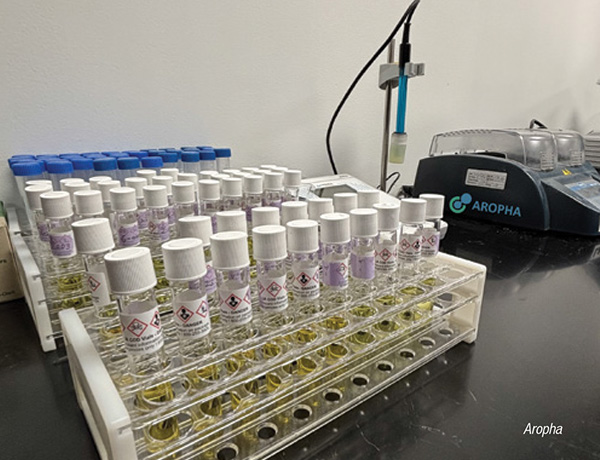For product developers, understanding a substance’s biodegradability is essential in many applications to ensure compliance with toxicity and environmental regulations. Aropha, Inc. (Cleveland, Ohio; www.aropha.com) has developed a platform for biodegradability testing that reaches far beyond the typical breadth of these types of persistence, bioaccumulation and toxicity (PBT) assessments. “Our approach is really unique. There are other accepted PBT assessment models, but they typically are very focused with limited datasets. They might only work in a very narrow domain that usually considers only small molecules. Our approach can assess even polymers and multi-constituent substances. We have developed the widest dataset available in the industry, and tailored it to reflect how these tests actually look in the real world,” explains Travis Johnston, co-founder and CEO of Aropha.
Aropha has combined its predictive artificial-intelligence platform with extensive laboratory and process-automation services to cater to such a large range of substances, while also staying abreast of regulatory updates, including REACH in the E.U. and the Toxic Substances Control Act (TSCA) in the U.S.
“The datasets in this field, specifically in PBT properties of larger molecules, are among the most under-studied and unavailable in the industry. The data generated are are often very academic in nature, and many larger companies keep their data in-house. So when we compiled our dataset, it was about ten times larger than the largest dataset that has been published to date. Much of the data come from the work we do in our own laboratory, but we are still extremely mindful of data security for our customers. We never incorporate customer data into our models without their explicit consent. It helps that we have physical testing to back up the data, rather than being a company focused strictly on modeling, which wouldn’t necessarily always have the capability to easily incorporate new data to improve models,” says Johnston.

Currently, the largest traditional systems for testing persistence use about 120 reactors for tests that would span anywhere from 28 to 60 days or longer, whereas Aropha’s platform can screen hundreds of chemicals in less than five minutes, notes Johnston. “Ours is the only platform that can do these types of evaluations at this scale, especially for polymers and multi-constituent substances.”
Compostable polymers and fragrance formulations are two applications that have particularly benefited from the wider availability of PBT assessment capabilities. “With compostable polymers, the amount of structural variation that they can have, especially in the early stages of development, is really helpful to screen, because small iterations can have a major impact when you end up at the final product stage,” says Johnston. In fragrances, the wide range of potential molecules in a given formulation can sometimes makes them volatile or partially insoluble, making them difficult to test using traditional experimental methods.